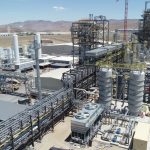Two emerging European energy companies have announced plans to produce synthetic aviation fuel, or e-SAF, at new manufacturing plants using low-cost renewable power. E-fuels are produced by combining water and renewable electricity to create green hydrogen, which is then blended with captured CO2 to create low carbon fuel. However, the high cost of renewable energy in many locations makes this fuel extremely expensive. In Germany, Spark e-Fuels has just announced a €2.3 million ($2.4m) pre-seed funding round, led by climate-focused investor Nucleus Capital, to progress a pilot e-SAF production plant, using proprietary technology which varies the rate of SAF production based on the availability of cheap renewable power. Following its recent partnership with Boeing, Norwegian company Norsk e-Fuel has joined with strategic German investor Prime Capital and renewable energy company RES to progress Project Alby, a new e-SAF plant in Sweden.
Synthetic fuels are attracting increasing attention, not just because of the scarcity of commonly used feedstocks such as fats, oils and greases for new fuels, compared to the abundance of CO2, but also a sub-mandate within the European Union’s ReFuelEU initiative, which requires e-fuels to comprise at least 1.2% of supplies at EU airports from 2030 and 35% from 2050.
Berlin-based Spark e-Fuels has patented ‘demand-responsive technology’ that enables it to vary the rate at which synthetic fuels are produced based on the availability of inexpensive green power. The company says its flexible process also simplifies SAF manufacturing by decoupling elements of conventional production, with both features appealing to lead investor Nucleus Capital, together with Zero Carbon Capital, Chemovator, Voyagers.io, 1.5° Ventures and IBB Ventures, the climate technology division of Investment Bank Berlin.
“We have a global data model that gives us optimal production locations considering renewables cost, transport cost, interest rate and CO2 availability,” said Spark e-Fuels CEO and co-founder Mathias Bösl. “But the big advantage of our technology is a different one. Our technology is able to vary the load of the chemical process, meaning that it can run at full capacity if a lot of energy is available and reduce capacity if less energy is available.
“The goal is to connect our technology directly with cheap renewable energy, which is much cheaper than constant grid electricity in locations with optimal renewable energy potential like Spain, Morocco and Australia, and not to require expensive grid infrastructure or oversized and expensive hydrogen and battery storage.”
Bösl said his company’s production features two stages – the conversion of CO2 and hydrogen into syngas, then a Fischer-Tropsch process to convert the syngas into liquid e-fuels.
“For conventional technologies, the first step unfortunately only offers a conversion of 50-60% of CO2 to syngas, which means that 40-50% remains CO2,” he said.
“This gas stream cannot be used in the FT process and has to be recycled. Due to these large recycle streams the two processes are strongly coupled, which significantly decreases energy efficiency and flexibility.
“In contrast, our syngas process reaches almost full conversion of CO2 and hydrogen to syngas and thus does not require any recycle streams and allows for decoupling the processes very well. This increases the flexibility, increases the energy efficiency and streamlines the process significantly.”
Spark’s demand-responsive technology and claimed capability to use all waste CO2 in e-fuel production without the need to recycle residual volumes appealed to lead investor Nucleus Capital, together with Zero Carbon Capital, Chemovator, Voyagers.io, 1.5° Ventures and IBB Ventures, the climate technology division of Investment Bank Berlin.
“We were drawn to Spark’s ability to integrate renewable energy into chemical production in a demand-responsive way,” said Isabella Fandrych, General Partner at Nucleus Capital. “This approach is not only essential for SAF but has wider applications across the chemical industry, which must decarbonise rapidly.”
In Sweden, Project Alby has been announced by Norway’s Norsk e-Fuel, strategic investor Prime Capital and renewable energy supplier RES to produce at least 80,000 tonnes of synthetic fuel per year at a new plant in the municipality of Ånge, 370 kilometres north of Stockholm.
The partners said the location was chosen because extensive volumes of renewable energy are generated in the region, delivering low electricity prices for e-fuel production.
Prime Capital recently acquired the project’s 14-hectare site, which was pre-developed by RES, and will now be progressed with Norsk e-Fuel, which has also announced projects in Norway and Finland.
“This project is a milestone for Norsk e-Fuel as we expand into Sweden and continue to lead the charge in providing fossil-free fuels for the aviation industry,” said the company’s CEO, Karl Hauptmeier.
“This partnership is a key step in reducing aviation emissions and accelerating Sweden’s transition to a more sustainable future,” added Prime Capital’s Managing Director, Jens Walzner.
“This collaboration brings together Norsk e-Fuel’s cutting-edge advancements in synthetic SAF development as well as RES’ exceptional capacities in delivering projects with Prime Capital’s extensive experience in renewable energy infrastructure and Power-to-X project development.”
Matilda Afzelius, CEO of RES in the Nordics, welcomed the collaboration to support the company’s vision to enable widespread access to affordable, zero-carbon energy. “This partnership strengthens our ability to drive the green transition forward,” she said.
In January, Norsk e-Fuel entered into a strategic partnership with Boeing to support the development of industrial scale power-to-liquids facilities in the Nordics and globally.
“Boeing’s investment will further accelerate our project pipeline and will facilitate the broader aviation industry’s transition to net-zero emissions,” commented Norsk e-Fuel CCO Lars Bjørn Larsen.
Added Steve Gillard, Boeing’s Regional Sustainability Director: “Our partnership to advance e-fuels will help mobilise the commercialisation of SAF in the Nordics and across the world, increasing accessibility and availability for our customers as we help build a robust SAF ecosystem.”
The move was welcomed by Norsk e-Fuel partner and shareholder, airline Norwegian. “We are pleased to welcome Boeing on board,” said Geir Karlsen, CEO of Norwegian. “Their investment marks a significant milestone for Norsk e-Fuel and confirms the positive development we have had. We look forward to leveraging Boeing’s expertise and experience in the development and growth of this pioneering industry. This investment also reinforces the need for a supportive policy environment to full realise the potential of e-fuels production in Norway, in line with the Norwegian parliament’s call.”
Photo (Norwegian): Low-cost airline Norwegian is an investor in Norsk e-Fuel















More News & Features
Lessons learned from the collapse of Fulcrum BioEnergy
Early data shows uncertainty that UK SAF mandate can be met in its first year
Swiss advanced SAF technology startups Metafuels and Synhelion reach project milestones
PtX fuels have significant Asia-Pacific potential but face many barriers, finds report
Airfreight giants DHL Express and FedEx announce big US SAF deals
Asia-Pacific study reveals pessimistic outlook for SAF uptake by 2030 as Singapore details levy